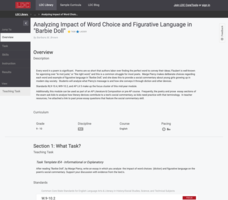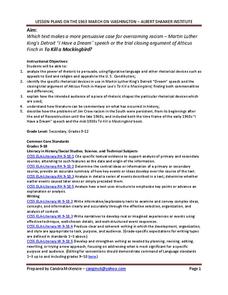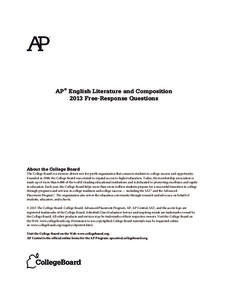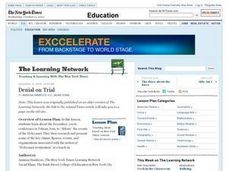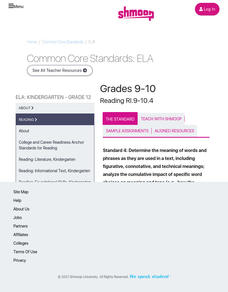Literacy Design Collaborative
Analyzing Impact of Word Choice and Figurative Language in "Barbie Doll"
After a close reading Marge Piercy's poem "Barbie Doll," class members craft an AP®-style explanatory essay in which they analyze the diction and other figurative literary devices the poet employs to deliver her commentary on modern...
EngageNY
Grade 9 ELA Module 4, Unit 1, Lesson 20
After comparing the working conditions of the enslaved people to those of the Indian indentured workers on the sugar plantations, class members examine the conditions and the actions of specific historical figures that Marc Aronson and...
Polk Bros Foundation
A Way to Analyze Paragraphs to Figure Out the Main Idea of a Nonfiction Text
Shrink up a section by asking pupils to write down the main idea for each of seven paragraphs. There is a space provided for each main idea. When students have completed this portion, they write down what they think to be the central...
K12 Reader
Elegy for Lincoln: Walt Whitman’s Poem
Walt Whitman's "O Captain! My Captain!" is one of the most famous and emotional tributes to Abraham Lincoln. Guide readers through the evocative elegy with a reading comprehension worksheet, complete with the poem's text and a photograph...
Curated OER
Magical Musical Tour: Using Music Lyrics to Teach Literary Elements
While music lyrics are often used to teach literary elements, the richness of this resource comes from the wealth of exercises, activities, and support materials provided in the packet. Although designed for gifted learners, the...
Constitutional Rights Foundation
Harriet Tubman and the End of Slavery
Harriet Tubman saved hundreds from slavery through what was called the Underground Railroad. Teach learners about her amazing accomplishments through the article that uses effective direct instruction. After reading, scholars break into...
PBS
Writing a Historical Poem
Students conduct field research of a historical site in order to discover a more complete understanding of a time period. They choose one particular historical figure and write a short poem about the site from the historical person's...
Benjamin Franklin Tercentenary
From Ben’s Pen to Our Lives
What would Ben do? Jumping off from the pseudonymous letters Ben Franklin fooled his older brother into publishing when he was still a teenager, young literary lovers dive into acting, writing, and addressing a local issue with wit and...
Benjamin Franklin Tercentenary
What Ben Read
Just what did Ben Franklin read? By juxtaposing Ben Franklin’s reading material as a young man with an analysis of his developed ideas, learners gain the opportunity to see how the influences of his youthful reading played out. Roman,...
PBS
Cardboard History
A PBS clip focused on collecting sports memorabilia launches this research project lesson. Class members then read Dan Gutman’s Honus and Me in which Wagner’s baseball card is used to time travel. The lesson ends with researchers...
Albert Shanker Institute
Strategizing for Freedom
Booker T. Washington, W.E.B. DuBois, Marcus Garvey, and A. Philip Randolph developed different views on how to advance civil rights for African Americans. Class members research these famous figures and their strategies before developing...
Albert Shanker Institute
Making the Case for Equality: A Comparison
Martin Luther King Jr's " I Have a Dream" speech and Atticus Finch's closing argument during the trial of Tom Robinson both address the societal need to overcome racism. After examining the rhetorical devices and figurative language used...
College Board
2013 AP® English Literature and Composition Free-Response Questions
Is there a moment that changed your life? Readers analyze novels and plays to discover the moments in which characters change from children to men. Writers also create essays to analyze literary devices used in The Rainbow and figurative...
Simon & Schuster
A Teacher's Guide to 1776 by David McCullough
David McCullough's Pulitzer Prize-winning novel, 1776, is the focus of a 28-page teacher's guide. The guide includes pre-reading questions, background information about key British and American figures, and chapter-by-chapter lessons.
Shmoop
ELA.CCSS.ELA-Literacy.RI.9-10.6
What does the author believe about his topic? Why did he write in the first place? Challenge your class to figure out the answers to these questions as they read through informational texts. The resource provides a breakdown of the...
Prestwick House
Rhetorical Devices in Political Speeches
Have you ever watched a political speech and felt your heart beat a little faster, and your opinion either solidify or begin to slightly change? Rhetorical devices can be a strong tool in an effective and powerful speech. A short lesson...
Curated OER
Abigail and John in Love
The second instructional activity in the series asks groups to analyze an exchange of love letters between Abigail and John Adams. Scholars identify the many allusions and references in the letters and consider what they can infer about...
Benjamin Franklin Tercentenary
The Autobiography of Benjamin Franklin
Need a model for character education? Benjamin Franklin presents himself as in a constant state of striving to become the man he hoped to be, making his autobiography is far more accessible to learners than those of people who consider...
Teaching Ideas
Florence Nightingale Fact Cards
When you hear the name Florence Nightingale, what comes to your mind? Wartime nurse? The International Red Cross? Florence Nightingale's many contributions to the Crimean war effort, the welfare of injured soldiers, and the future of...
Curated OER
Denial on Trial
What is the "Faurisson Affair”? What is “Holocaust Revisionism”? What does freedom of speech entail? Do revisionists have a right to voice their ideas? Such questions are at the heart of a richly detailed, thought provoking lesson plan...
Curated OER
The 1:1 Transition: Paving a Smooth Road for Students
Teaching expectations, routines, and skills make the transition smoother for students and teachers alike.
National Endowment for the Humanities
Courage “In the Time of the Butterflies”: A Common Core Exemplar
The courage of Las Mariposas, the Mirabal sisters, is the focus of a series of activities designed to accompany a reading of In the Time of the Butterflies that ask readers to consider what it means to be courageous. Beautifully crafted...
Middle Tennessee State University
John Brown: Hero or Villain?
"Love it or leave it." "You're either for us or against us." Rhetoric and it's polarizing effects are the focus of a lesson that uses John Brown's attack on Harper's Ferry as an exemplar. Groups examine primary source documents,...
Shmoop
ELA.CCSS.ELA-Literacy.RI.9-10.4
Your pupils will be expected to determine the meaning of words and how those words affect the meaning of a text. Help them master this skill with the ideas listed here. First, look over the two activities that could be used for your...
Other popular searches
- Figurative Language
- Figurative Language Poetry
- Figurative Language in Poems
- Figurative Language Quiz
- Figurative Language Project
- Imagery Figurative Language
- Figurative Language Lessons
- Figurative Expressions
- Using Figurative Language
- Figurative Meaning
- Figurative Speech
- Figurative Language Worksheets


